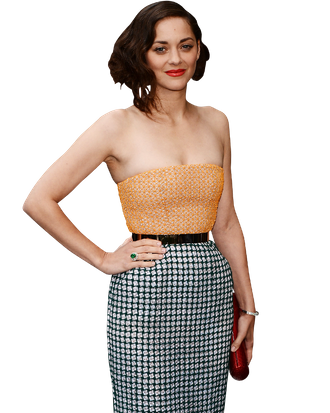
You saw her in this summer’s very American blockbuster, The Dark Knight Rises. But come fall, Marion Cotillard will be getting buzz for playing a double-amputee killer-whale trainer (yes, a double-amputee killer-whale trainer) in Jacques Audiard’s très français drama Rust and Bone. Jada Yuan spoke to the actress for New York magazine’s “Fall Preview” issue. Vulture got its hands on the complete transcript; highlights, below.
I read that you do a lot of research for your movies. What did you do to get ready for your role in Rust and Bone?
Well, I did kind of technical research, because I just had to find the physicality of the body language of someone who’s lost her legs. I wanted to find the authenticity of what it feels like, even though I will never, never know how it feels. But then about this character … most of the time, I read a script and then I understand the character right away — not everything about the character, otherwise it would be boring, maybe. But sometimes you have right away kind of a … you understand a lot about a person, and you understand the soul of this person, and then you will have to meet this person to learn more. With the character I have in Rust and Bone, I read the script and then I thought, My God, I don’t really understand her. And so that’s what I told Jacques Audiard, and I was kind of scared he would freak out. But that was what I felt, so that was what I had to share with him after I read the script. I was anxious about his reaction, and he told me, “Well, you know, I don’t understand her either. But that’s a good thing. We will have to take the road together, you and me, and find her, find who she is.” So that was kind of an amazing experience I was really looking forward to.
Let’s talk about the physicality of it, because I think that’s really interesting. When you say you did technical research to sort of know how it would feel to be without legs, what did you do?
Well, I don’t know if it’s very interesting, but I watched videos of people with no legs. I mean, each time I have to enter into a character and give life to a character, I do my best to believe that I’m old, or that I’m, I don’t know, desperate.
Your character has an affair in the movie. How did you do the sex scenes?
Well, with my legs, obviously [laughs].
Do they wrap them in tape and then green screen them out? I loved the sex scenes. It’s something you don’t see with disabled people in movies very much.
Well, we didn’t really think about the technique, because Jacques Audiard is … I remember when he was preparing the movie, he was writing e-mails to me, and he was [saying], “I spent an hour with the special effects, and I don’t want to spend anything. I just want you guys to be there with me, and we’re going to just give life to those characters.” So the technical part — we were lucky to work with amazing, amazing technicians. But then it felt like something real. You have to have a certain position with your legs not to make shadows and everything, but it’s not what is very important about the work we did. The most important was the director’s poetry, the way he filled this in with poetry and his vision of those people.
You rarely see a double amputee played in such a sexy way. Do you know what I mean? She has this thriving sex life, and a man who falls in love with her. Was that important to you? Did you respond to that?
Yeah, well, because this is a movie about rust, bone, flesh, blood, and love. And they’re young, they’re lost, but they’re beautiful, and they’re coming back to life, and in a big way they’re really coming back to life. And life with surrender is beautiful.
The Marine World part was very interesting to me, because when you describe the movie to people and you talk about killer whales, immediately they start to have an idea of a different kind of movie than it might be. Why do you think the whales are so important to the story?
Well, it’s an element of life, and it’s her violent wake-up. I won’t say that whales are violent, because I don’t think they are, but how we treat them is more violent than the animal itself. I think it must be the strength.
So you actually were directing these whales, is that correct? You were making them do those movements?
Yes.
How long did it take you to learn how to do that? Were you scared?
No, I was not scared. I mean, I’m very uncomfortable in a captivity area. I remember when I heard about Jacques’s movie very early on I thought, Oh, my God, I could never do such a movie. Because I would have to work with whales, and in a Sea Land, and it’s like the zoo. I never visit the zoo. I never go to the Sea Land, because to me it’s like a human being turning animals into monsters. Then I was there, and I had to work with them. Right away, the trainer was amazing. I had all those thoughts about who those people are, and then suddenly I just saw people who loved those animals — even though I will never go back again [laughs], and I really don’t like it. I have a very easy contact with animals, and the relationship with the whales was there right away. So I was not scared, and it was not very hard.
You’re basically the one French actress who’s managed to have a really blossoming Hollywood career, not just in independent movies but — you’re in Batman. I believe when Rust and Bone came out in Cannes, I thought there was a bit of an outcry among the French that it maybe didn’t seem French enough, or it was too commercial? Am I wrong?
I don’t know. Cannes is the taste of people … we were very happy that the movie did very well at the box office in France. That’s what is important. I don’t know if it’s too commercial. I don’t know. I never see the movies like that. My opinion on the movie I do is: Sometimes I like it, and sometimes I don’t. That happens sometimes. But I love the movie, and I’m very proud to be in it, and I’m so happy that people want to see the movie. That’s it.




